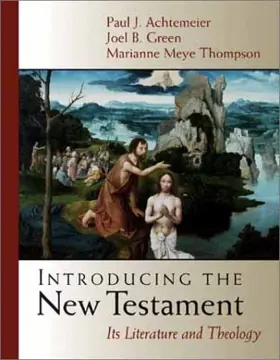

Introducing the New Testament: Its Literature and Theology
Pages
624 pages
Publisher
Eerdmans
Published
8/1/2001
ISBN-13
9780802837172
Reviews
[Full Review]
Recent years have seen the publication of both new introductions to the NT (R. Brown, 1997; L. McDonald and S. Porter, 2000) and revisions of existing volumes (D. Barr, 2002; J. Drane, 2001; B. Ehrman, 2000; L. T. Johnson, 1999). Joining the former group is this impressive tome by a trio of leading biblical scholars. Achtemeier, Green, and Thompson are associated with prominent theological seminaries (Union in VA, Asbury, and Fuller, respectively), and the theological orientation of their introduction is reflected in more than just the subtitle of the book. The authors assert on p. 1 that “The most distinctive characteristic of the NT documents is surely their function as Scripture within the Christian church.” Later they observe that “most people who read the NT do so not because they find it interesting as literature or history. They read it because they share the conviction that this collection of documents, together with OT, comprise (sic) the Scriptures of the church, its normative witness to the work of God in the world through Jesus Christ.” (p. 9) The authors’ approach is not uncritical of this readership, however. They acknowledge the abuse of Scripture, its checkered history of interpretation, including its use to support “cruel dictatorships, abuse of women, the institution of slavery, and persecution of the Jews.” (p. 12) After an introductory chapter discussing literary, historical, and theological angles on the NT, there is the obligatory chapter on backgrounds. Rather than the usual division according to Jewish vs. Greco-Roman categories, the authors first treat “Environmental Conditions,” broad cultural and political phenomena such as Hellenism, Jewish identity, and urban life, and then “Institutional Contexts,” social dynamics such as temple, Torah, kinship, patronage, and honor. In this way the authors avoid, not only by explicit statement, but also by structure, the false dichotomies of Jewish vs. Hellenistic or Palestinian vs. Diaspora.
[Full Review]

